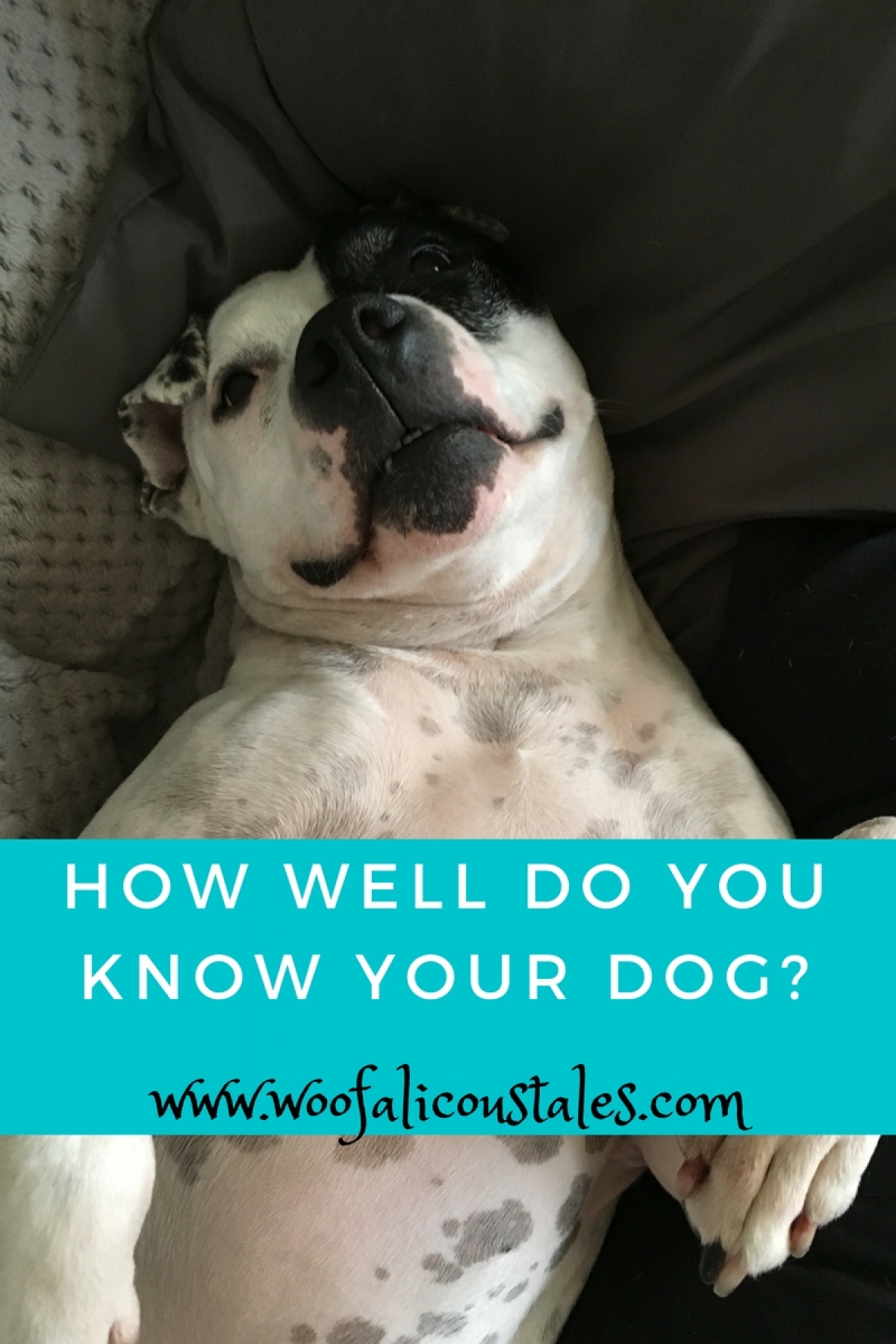
Hey Woofa’s,
Following on from my post on What’s Dognitive Therapy? I thought I’d ask How Well Do You Know Your Dog?
I believe it’s really important to know your dog, what their triggers are, how they interact with other people and other dogs etc. We need to know our dogs so we can keep them safe. This lets them know they can trust us.
When you first meet someone you’re interested in you want to get to know them. This is no different when it comes to your dog! We all need to invest time in getting to know our dogs.
Dog’s do speak to us we just need to learn how to listen. Communicating with your dog is similar to learning sign language. All interaction is through body language, sound and reactions.
WHAT I LEARNT ABOUT BILLY!
Without a doubt I believe that our dogs know us 99.9% more than what we know them. They are way ahead of the game on this one.
We make ourselves so busy and distracted that we tend to misunderstand our dog’s behaviour, or we ignore it, or we yell at them for trying to communicate something to us, because we don’t understand!!!
I’m not here to tell anyone off, I’m just trying to make us more aware when it comes to our dogs.
I’m guilty of misunderstanding Billy. As previously mentioned, I believed he was so excited on his walks he just wanted to run and tug-o-war on his lead because he was having fun!!!
Until it was pointed out to me one day by a new dog training neighbour, that it was 10% excitement and 90% anxiety that he was showing. Needless to say, this made me feel like a failure as a dog parent, how could I have missed this?? I work with dogs all day and I missed this in my own dog!!!
Although, now that I AM aware of this I can put procedures in place to help Billy. Through desensitisation we’re working on his anxiety of being outside, we’re taking a calm, patient approach and bit by bit Billy will realise the world isn’t all bad and he can enjoy his walks.
WHAT I DO KNOW ABOUT BILLY!!
I’m sharing a few things I know about Billy in the hope it will encourage you to make an extensive list of what you know about your fur babies.
Whether you think it’s irrelevant or not, write it down and really study your fur kids behaviour.
What may seem insignificant to you, may have a huge impact on your dog.
This list may help get you started.
- knowing that Billy is not a big fan of being out of his comfort zone we won’t be taking him to a dog park or dog beach or anywhere that will trigger his anxieties, anytime soon. Or on a long walk. Short simple walks that show him each time he’s safe is where we’ll start.
- we know that Billy hates small wheels that go fast – i.e. skateboards, scooters, remote control cars etc so we won’t be taking him to a skate park anytime soon.
- Billy feels safe at home.
- we know that Billy loves going on small car rides – thanks to Dean taking him at least twice a week for a drive.
- Billy knows the difference between his drive harness and his walking lead. When his drive harness is on he knows to go out the door and sit by the car!
- through recall training Billy can be out in the front yard with us, without running off. However, beyond the letterbox his recall still needs working on!
- we know the foods that effect Billy (makes him pass wind)!
- Billy chases the birds, barks at cats out the window and chases blue tongue lizards.
MY POINT – it’s important to know your dog’s behaviour (no matter how big or small) and this is just one aspect of it. Once you learn and know your dog’s triggers you can work with them. Understanding why your dog does what it does is just one step closer to clear communication.
WHERE TO START!
1 Write down a list of what you do know about your dog right now!
i.e. what excites them, what makes them bark, do you know the difference between their barks, what food/treats do they like, when do they sleep, who seems to be their leader, what are their cute behaviours, bad behaviours or strange behaviours etc
You get the idea! Don’t be lazy do this for your fur kids!
2. Pick out the behaviours in your dog that you would like to change and write down why?
3. Are there any behaviours YOU might be doing (unintentionally or not) that could be contributing to your dog’s behaviour!
I.e. sometimes when we’re walking Billy will turn around and tug-o-war on his lead. I’m not sure if it’s out of frustration that we’re not walking fast enough for him, or his anxiety etc but to stop this behaviour we’ve discontinued playing tug-o-war games with him.
4. Write down ways YOU could change YOUR BEHAVIOUR in order to benefit both you and your dog?
Be honest, no-one else has to see this list only you and your dog. I mean smoking around your dog isn’t helping them either, are you yelling at them for something their doing that’s annoying you? Have you tried to figure out WHY they are doing it? Do they do it at the same time YOU do a certain behaviour??
5. Have you ever researched your dog’s breed? Or if it’s a mixed breed, researched whatever breeds are mixed?
I.e. it’s always good to have a bit of background knowledge on what your dog’s breed was originally bred for!
Why – because even though we have domesticated our pets they still have some traits of their breed.
a lot of working dog breeds are bred to work with cattle and rounding them up is one of their jobs.
I have had working dog breed owners complain to me that their dog nips at the kid’s ankles when they’re outside playing!!!! I’m surprised that they haven’t realised that their dog is keeping the kids safe by rounding them up so the dog can take care of them!!! The dog sees this as it’s job!
6. What do you think your dog’s triggers are? What sets off this unwanted behaviour?
7. Can you think of ways you can remove your dog from these triggers? Or can you work towards slowly desensitising your dog towards these triggers?
WHAT DOES THIS MEAN?
So many people say to me, I wish my dog could talk to me………… well they actually are trying to tell us things all the time, we just need to take the time to listen and understand.
We want to work towards having calm, happy and centred dogs!
By taking the time to get to know your dog you are one step closer to communicating effectively with them.
Your dog will love you even more for doing it.
Who knows what you might learn about yourself along the way also.
Billy and I would love to know if you know what your dog’s triggers are? How well do you know your fur kids?
Drop us a line in the comments below.
Cheers

Related Posts
Why You Shouldn’t Discipline Your Dog With Water!
Hey Woofa’s, I follow quite a few dog pages on Facebook – as…
04 May 2018How Safe Is Your Postie From Your Dog?
Hey Woofa’s, With all of, Sydney, New South Wales in some form of…
04 May 2018



Leave A Comment